英语语法大攻克--- 冠词
英语语法---名词、代词和冠词

英语语法---冠词冠词基本用法【速记口诀】名词是秃子,常要戴帽子,可数名词单,须用a或an,辅音前用a,an在元音前,若为特指时,则须用定冠,复数不可数,泛指the不见,碰到代词时,冠词均不现。
【妙语诠释】冠词是中考必考的语法知识之一,也是中考考查的主要对象。
以上口诀包括的意思有:①名词在一般情况下不单用,常常要和冠词连用;②表示不确指的可数名词单数前要用不定冠词a或an,确指时要用定冠词the;③如复数名词表示泛指,名词前有this,these,my,some等时就不用冠词。
英语语法---名词(一)可数名词的复数构成A.规则变化1.单词后加S2.单词后加ES(以CH等结尾的单词)3.以F或FE结尾,变为VE加SB.不规则变化1.单复同形deer sheep fish Chinese Japanese means2.只有复数形式people police cattl clothes trousers, glasses3.不规则变化man---- men woman---- women foot ----- feet tooth-----teethmouse ------mice child-----children German------Germans4.复合名词的复数1)将后一部分变成复数Englishman---Englishmen gentleman---gentlemen policewoman----policewomen grown-up----grown-ups2)将主要成分变成复数looker-on----lookers-on son-in-law----sons-in-law3)如果前一词是man, woman,将两部分都变成复数men doctors women小结名词单数变复数规则【速记口诀】单数变复数,规则要记住,一般加s,特殊有几处:【妙语诠释】①大部分单数可数名词变为复数要加s,也就是单词如果以ch,sh,s,x等结尾),则一般加es;②以o结尾的单词除了两人(negro,hero)两菜(tomato,potato)加es外,其余一般加s;③以f或fe结尾的单词一般是把f,fe变为ve再加s;④英语中还有些单词没有规则,需要特殊记忆,如child—children,mouse—mice,deer—deer,sheep—sheep,Chinese—Chinese,ox— oxen,man—men,woman—women,foot—feet,tooth—teeth。
英语语法大攻克--冠词,代词,名词练习
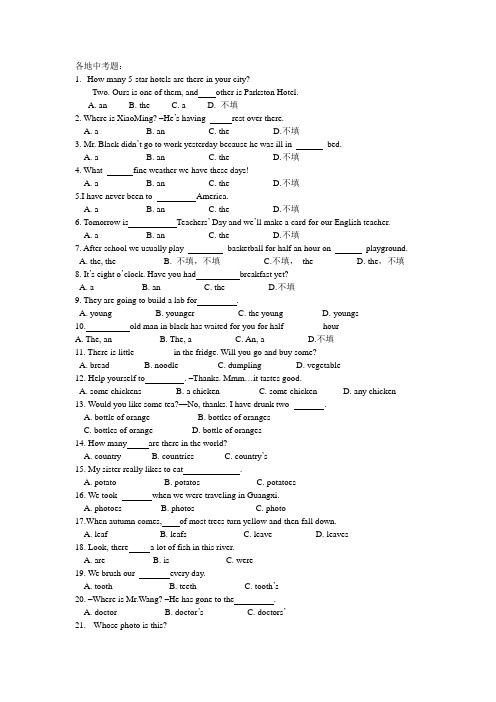
各地中考题:1.--How many 5-star hotels are there in your city?---Two. Ours is one of them, and other is Parkston Hotel.A. anB. theC. aD. 不填2. Where is XiaoMing? –He’s having rest over there.A. aB. anC. theD.不填3. Mr. Black didn’t go to work yesterday because he was ill in bed.A. aB. anC. theD.不填4. What fine weather we have these days!A. aB. anC. theD.不填5.I have never been to America.A. aB. anC. theD.不填6. Tomorrow is Teachers’ Day and we’ll make a card for our English teacher.A. aB. anC. theD.不填7. After school we usually play basketball for half an hour on playground.A. the, theB. 不填,不填C.不填,theD. the,不填8. It’s eight o’clock. Have you had breakfast yet?A. aB. anC. theD.不填9. They are going to build a lab for .A. youngB. youngerC. the youngD. youngs10. old man in black has waited for you for half hourA. The, anB. The, aC. An, aD.不填11. There is little in the fridge. Will you go and buy some?A. breadB. noodleC. dumplingD. vegetable12. Help yourself to . –Thanks. Mmm…it tastes good.A. some chickensB. a chickenC. some chickenD. any chicken13. Would you like some tea?—No, thanks. I have drunk two .A. bottle of orangeB. bottles of orangesC. bottles of orangeD. bottle of oranges14. How many are there in the world?A. countryB. countriesC. country’s15. My sister really likes to eat .A. potatoB. potatosC. potatoes16. We took when we were traveling in Guangxi.A. photoesB. photosC. photo17.When autumn comes, of most trees turn yellow and then fall down.A. leafB. leafsC. leaveD. leaves18. Look, there a lot of fish in this river.A. areB. isC. were19. We brush our every day.A. toothB. teethC. tooth’s20. –Where is Mr.Wang? –He has gone to the .A. doctorB. doctor’sC. doctors’21.-- Whose photo is this?--It’s .A. meB. mineC. myD. myself22. We believe you all enjoyed at Kate’s birthday party last night.A. ourselvesB. usC. ours23. Don’t leave Mary by . She is only one year old.A. herB. sheC. herself24. -- is that man? –He is my headmaster.A. WhoB. WhoseC. What25. There are many beautiful flowers on sides of the road.A. eachB. everyC. allD. both26. I’ve read several books, but of them are funny.A. neitherB. eitherC. noneD. all27. There are many big shops on side of the street.A. allB. bothC. anyD. either28. Grandpa Li has three sons. One is in Shanghai, is in Guangzhou and is in Beijing.A. another, anotherB. the other, the otherC. another, the otherD. the other, another29. Is there I can do for you?A. somethingB. anythingC. nothing30. –What kind of job would you like in this company?-- except being a doorkeeper.A. SomeB. NoneC. AnyD. All。
高考英语语法突破: 冠词、介词(短语)

第二讲冠词、介词(短语)冠词[思维导图]Ⅰ.冠词的基本用法一、不定冠词1.表示类指或指某类中的任何一个。
A virus is a very small living thing that causes disease.病毒是一种引发疾病的微生物。
2.表示泛指。
当说话人第一次提及某人或某物时通常用不定冠词,因此由不定冠词构成的名词词组往往带有不确定的含义,相当于a certain。
Experts think that the recently discovered painting may be a Picasso.专家们认为最近发现的那幅画可能是毕加索的作品。
3.表示量指。
不定冠词表示“一”这个数量,但数的概念没有one强烈。
Suddenly they heard a loud voice.他们突然听到砰的一声噪音。
4.表示“每”,相当于per,用在表示价格、速度、频率等的短语中。
Prices start at £13.95 a yard for printed cotton.印花棉布以每码13.95英镑的价格起售。
5.表示“同一,相同”,相当于the same。
They happen to be of an age and wear clothes of a color.他们碰巧同龄而且穿着同样颜色的衣服。
6.用在某些物质名词或抽象名词前,使之具体化。
这样的物质名词有:rain,snow,fog,wind,drink,coffee,beer,fire,paper等;抽象名词有:success,failure,surprise,pleasure,beauty,wonder,comfort,danger,shock等。
He suddenly appeared on a rainy night,which was a great surprise to us.他在一个雨夜突然出现,这使我们非常吃惊。
冠词,英语语法-词类3

22
12.某些用介词by构成的表达方式的短语通常用 零冠词: 1) 表示乘坐交通工具. by bus, by ship, by land, by sea, etc. 2) 表示通讯或通信等方式. by phone, by post, by radio, etc. 13. 当两个或两个以上名词并用时,常省去冠词。 例如:Failure is the mother of success.
14
11. 用在表示民族、阶层、阶级的名词前。 the Chinese people 中国人民 the working class 工人阶级 the peasantry 农民阶级 the aristocracy 贵族 the intelligentsia 知识分子 12. 用在形容词only, very, same, exact等词前 Eg. This is the very thing I’ve been looking for.
拼音 单元音 双元音 a [] [:] [i] [] o [] [:] [ i] e [] [:] [i ] [] [] i [i] [i: ] [ i] u [] [:] [e][][] []
3
辅音音标有以下的
辅音 [] [] [] [] [] [] [] [] [] [] [] [] [] [] [] [] [] [] [] [] [] [] 扁唇音 [] []
12
6. 方位、乐器名词前要加the Eg. In the Northeast it will be fine. He plays the piano very well. 7. 在江河、海洋、岛屿、海峡、港湾、山脉、 群岛、沙漠等地名前要用定冠词。 Eg. the Yangzi River 扬子江 the Black Sea 黑 海 the Rocky Mountains 洛矶山脉 注意:湖泊前一般不用定冠词:Dongting Lake, Lake Success, Lake Baibal 贝加尔湖等等。
小学英语语法课件-冠词课件

Par0t13、回顾中小学生守则
定冠词 目 录
02、学生日常行为规范
CONTENTS
03、班级纪律公约
t0h4e、校内外安全须知
定冠词
定冠词 the 用于各种名词前面, 目的是对名词做个记号,表“特指”。 在词汇表中意思解释为: “这个,那个,这些,那些”。 所以+ 可数/不可数单数复数都可以。
去旅行 总之 看一看 休息一下 玩的开心
不定冠词用法小结
1.表示数量“一”。( 但数的概念没有“one”强烈。) 2.用于第一次提到的人或事物的名词前。 3.指某人或某物,但不具体指明哪个人或物。 4.表示类别,泛指一类人或物。(a 和an 不必翻译) 5. 用于固定搭配中。
不定冠词a/an的区别 a 放在辅音音素开头的名词前面; an 放在元音音素开头的名词前面。
定冠词的用法小结
1.用来特指某些人或事物,这是定冠词的基本用法。 2.用在谈话双方都心知肚明的人或事物。 3.指上文提到的人或事物。 4.用在序数词以及形容词最高级前。 5.用于乐器名词前。 6.用于世界上独一无二的事物或由普通名词构成的专有名词前。 7.用在表示姓氏的复数名词前,表示夫妇二人或一家人。 8.用在形容词或单数名词前,表示一类人或事物。 9. 用在习惯用语中表示时间、地点、方位等。
的“帽子”。 ➢ 冠词是一种虚词,一般用在名词之前,用来帮助说明名词所
指的人或事物的词。 ➢ 注意:
冠词不能脱离名词而独立存在, 不能单独作为句子成分。
冠词概念 a
不定冠词 an
冠词
定冠词
the
零冠词
没有冠词
Par0t1、2 回顾中小学生守则
不定冠词 目 录
02、学生日常行为规范
英语常用50个冠词

英语常用50个冠词英语中的冠词分为不定冠词和定冠词两种。
不定冠词指的是"a"和"an",定冠词指的是"the"。
以下是英语中最常用的冠词。
不定冠词aan不定冠词用于表示不确定的数量或身份,通常用于单数可数名词前。
例如:"I saw a bird in the tree."a fewa little"a few"和"a little"都表示数量的少量,但"a few"用于可数名词,而"a little"用于不可数名词。
例如:"I have a few books to read"和"I have a little time to spare."any"any"通常用于疑问句、否定句和条件句中,表示任何一个或任何数量。
例如:"Do you have any brothers or sisters?"和"I don't have any money."another"another"表示另一个,通常用于可数名词前。
例如:"Can I have another cup of coffee?"certain"certain"表示特定的、确定的,通常用于不可数名词前。
例如:"I have certain information that you might find interesting."each"each"表示每一个,通常用于可数名词前。
例如:"Each student must submit their own project."either"either"表示两者中的任意一个,通常用于疑问句和否定句中。
英语语法大攻克--冠词详解

冠词的用法一、不定冠词a(an)的用法A. 不定冠词a(an)用于单数可数名词前。
a用于辅音字母开始的词前;an用于元音字母开始的词前。
如:a girl an English bookB. 不定冠词用来表示类别,指某一类人或某一类事物中的一个(泛指)。
His father is a doctor.C. 不定冠词用于单数可数名词前,可以表示其全类(泛指)。
如:An English teacher teaches the students how to learn English.二、定冠词the的用法①表示上文提到过的人或事物。
如:He bought an English-Chinese dictionary this morning. The dictionary is very good.②用于单数可数名词前,表示整体或类别。
如:The panda is a rare animal.=A panda is a rare animal. = Pandas are rare animals.③用来表示世界上独一无二的事物。
the sun, the moon, the sky, the earth, the world④用于表示阶级、党派的名词前。
the Chinese Communist Party⑤常用于含有普通名词或形容词的专有名词前。
A. 用于许多江海,山脉,群岛等名词前:The Yellow River the Pacific OceanB. 用于由普通名词构成的国名:The People's Republic of China the United StatesC. 用于机关、团体、朝代、时代、报刊杂志等名词前:the United Nations the Tang dynasty the People's Daily the Peace Hotel⑥用于表示方位的名词前。
全新英语语法——冠词

全新英语语法—冠词冠词是英语中位于名词前面的一种虚词。
它不能单独使用,只放在名词的前面,在帮助名词表达某种含义,故称为冠词。
冠词有三个,即a,an和the;冠词分为三类,a,an被称为不定冠词;the被称为定冠词;名词前不用冠词时被称为零冠词。
01-1 不定冠词1.不定冠词概说不定冠词a,an通常用于单数的可数名词前,复数名词或不可数名词前不可使用不定冠词a或an;表示“一”的概念时,a/an与one同义,但不强调数量。
a用于辅音开头的单词前,一般弱读为/ə/,在强调时可重读为/ei/;an 用于元音开头的单词前,一般弱读为/ən/,在强调时可重读为/æn/。
如:a computer一台电脑;an old man 一位老人;an ugly woman 一个相貌丑陋的女人。
注意:①这里的元音和辅音指的是音素,不是指字母。
如:a university 一所大学;an honest man 一个诚实的人。
②有些以元音字母开头的单词,其发音确实辅音,前面的冠词要用a。
常考单词有:a useful book 一本有用的书;a university professor 一位大学教授;a European 一个欧洲人;a one-eyed horse 一匹独眼的马;a uniform 一套制服;a “u”一个字母u。
③有些以辅音字母开头的单词,其发音却是元音,前面的冠词要用an。
常考单词有:an hour 一个小时;an honest boy 一个诚实的男孩;an“f”一个f字母;an “l”(m,n,s,x)一个l(m,n,s,x)字母。
④以u字母开头,发元音的单词有:an umbrella 一把雨伞;an ugly man 一个丑陋的人;an unknown man 一名无名小卒。
2.不定冠词a,an的8种用法(1)表示某人或某物,但不具体说明是何人或何物。
如:There is a dog lying on the ground. 有一只狗躺在地上。
英语语法大攻克--冠词

冠词虽小,只有a,an和the三个,但却是历年各地中考必考语言点之一。
就考查题型而言,以单项选择为主,有时在完形填空中出现。
从命题意图看,以考查不定冠词a和an的用法区别、不定冠词和定冠词的用法区别为主。
同时考查冠词的各种不同用法。
-考查重点冠词的考查重点包括不定冠词a和an的用法,定冠词the的用法和零冠词的用法等。
其中,不定冠词与定冠词的用法区别以及在具体语言环境中冠词的应用是历年中考试题考查的热点,也是今后的考查方向。
一.冠词概述冠词是虚词,本身不能单独使用,也没有词义,它用在名词的前面,帮助指明名词的含义冠词分为不定冠词和定冠词两种。
不定冠词仅用在单数可数名词前面,表示“一”的意义,但不强调数目观念,只表示名词为不特定者。
定冠词则表示名词为特定者,表示“这”,“那”,“这些”,“那些”的意思,在可数的单复数名词或不可数名词前面都可以用二.a和an的区别不定冠词有a和an两种形式,a用于辅音(不是辅音字母)开头的词前,an用于元音(不是元音字母)开头的词前。
例如:a boy,a university,a European country;an hour,an honour,an island,an elephant,an umbrella三.不定冠词的用法1.泛指某一类人、事或物;相当于any,这是不定冠词a/an的基本用法。
2.泛指某人或某物,但不具体说明何人或何物。
3.表示数量,有“一”的意思,但数的概念没有one强烈。
4.表示“每一”,相当于every. 例如,I go to school five days a week.我一周上五天课。
5.用在序数词前,表示“又一”,“再一”。
例如,I have three books. I want to buya fourth one.我已经有三本书,我想买第四本。
6.用在某些固定词组中:a lot(of)许多,大量;after a while过一会儿。
英语语法大攻克--冠词名词考点训练(三)

训练(三)---It is eight-kilometre walk from here.A. the; anB. /; anC. the; aD. /; a (2005) 5. ---What would you like for ~ breakfast, Mr Scott?---Three pieces of bread with ~ cup of black tea, please.A. a; aB. /; theC. a; theD. /; a(三)考点练习:1. There is "x" in word "box".A. a; anB. a; theC. an; theD. a; a2. The house in front of the river is on fire.A ./; / B. the; the C. the; / D./; a3. -- What's the matter with you?-- I caught bad cold and had to stay in bed.A. a; /B. a; theC./; theD. a; a4. My uncle isn't old man, and he likes playing football.A. a; aB. an; anC. the; theD. an; /5. -- What will you do on Christmas Eve?-- We'll have unusual party.A. aB. anC. theD. ]6. Greens are on visit to a beautiful city in China.A./, aB. A; theC. The; aD. The; /7. The zoo is a bit far. It will take us half hour to get there by bus.A. an; aB. an; /C. a; theD./; /8. They went to Yuexiu Park on Children's Day.A./; /B. the; theC./; theD. the; /9. She is'neither European nor American. She is from Australia.A. a; a;/B. a; an; theC. a; an;/D. 1: the; the10. sun is much bigger than earth.A..A; theB. A; anC. The; anD. The; the11. Changjiang River is longest river in our country.A.The; theB. A; aC. The; aD. A; the12. -- What colour is orange?-- It' s orange.A. an; anB. an; theC. an; [D./; an13. Mr Wang always gives me hand when I am in trouble.A. aB. anC. theD. /14. During the summer holidays he played piano in the morning and played football in the afternoon.A. the; theB./; theC. the; /D./; /5. He often says rich should help poor.A. the; aB. a; theC. the; theD./; /16. This is song I've told you about. Isn't it beautiful one?A. the; theB. a; aC. the; aD. a; the17. We had lunch together moment ago.A. /; aB. a; aC. a; /D. the; the18. I think study is important work.A. aB. /C. anD. the19. Mary was ill in bed, and her mother was sitting on bed by her.A. the; aB. /; theC. the; theD. the; /20. India and China are of same continent.A. /; aB. The; theC. /; /D. /; the名词A. voiceB. soundC. noiseD. singing5. --Help yourself to .--Thanks, Mum; it tastes good.A. some chickensB. a chickenC. some chickenD. any chicken6. Twelve were hurt, but no were lost in that accident.A. person; lifeB. people; livesC. peoples; livesD. persons; life (2002) 7. way it is from Guangzhou to Paris!A. How longB. What a longC. How a longD. What long8. ---You look very tired this morning. What did you do yesterday afternoon?---I did Christmas shopping.A. a lot ofB. a few ofC. a number ofD. a piece of (2003) 9. wonderful music it is! I like Bethoven's better than anybody's.A. WhatB. ,How aC. What aD. How(2004) 10. --Thanks for giving me I wanted.--You are welcome.A. the informationB. an informationC. the informationsD. information(2005) 11. -- What about Mr. Black's speech?-- Wonderful! There were people there.A. a large number ofB. muchC. a great deal ofD. lots12. -- Did you and your friends ride your bicycles to the beach yesterday afternoon?-- Yeah. we had!A. How a funB. What funC. What a funD. How fun13. This is ~ that all of us believe it's very important.A. such useful informationB. so useful an informationC. so useful informationsD. such a useful information (三)考点练习:1. The people want to have some for supper, so they decide to catch now.A. fishes; muchB. fish; manyC. fish; muchD. fishes; many2. -- Are those ?-- No, they aren' t. They' re .A. sheep; cowsB. sheep; cowC. sheeps; cowD. sheeps; cows3. -- Would you like ?-- Thank you. I'm not thirsty.A. some breadB. some juiceC. any breadD. any .juice4. There is no in the bus so we have to wait for another bus.A. roomB. a roomC. roomsD. seats5. Last night, there was a food accide~at. The were iii, but no were lost.A. child; livesB. children; lifeC. children; livesD. child; life6. -- C/m I help you, sir?-- Yes, I'd like four and some peas.A. tomatosB. potatoesC. meatD. banana7. "I don't think that's a good for parking in the wrong place. You'll have to pay the fine?" said the policeman.A. ideaB. excuseC. reasonD. thought8. -- Who made a phone call for me just now, David?-- I don't know, but it was a girl'sA. soundB. noiseC. answerD. voice9. Please keep quiet. If you make a lot of , you may disturb others.A. soundB. noiseC. singingD. voice10. Paul has been in Guangzhou for over ten years. Guangzhou has become Paul's second .A. homeB. houseC. familyD. mom11.-- Would you like __ coffee?-- No, thanks. I've drunk twoA. any; bottles of orangeB. little; bottle of orangesC. some; bottles of orangeD. a few; bottles of orange12. There are a lot of down there, but hardly anyA. horse; peopleB. horses; peoplesC. horse; peopleD. horses; people13. He had something to write down and asked me for .A. a paperB. some papersC. a piece of paperD. some pieces of papers14. My school is about walk from my home.A. twenty minuteB. twenty minutes'C. twenty minute'sD. twenty minutes15. -- How many do you want?-- Two, please.A. kilos of eggB. kilo of eggsC. kilos of eggsD. kilo of bread16. The market isn't far from here. It's only bicycle ride.A. half an hours'B. half an hour' sC. half an hourD. an hour and a half17. His father gave him a .A. ten dollars billB. ten-dollars billC. ten-dollarbillD. ten dollars' bill18. These are very expensive.A. woman's handbagsB. woman handbagsC. women's handbagsD. women handbags19. There are two and four in our group.A. German; JapaneseB. Germans; JapaneseC. Germen; JapanesesD. Germen; Japanese20. Don't worry. Two will come here to help you.A. man doctorB. man doctorsC. men doctorD. men doctors21.-- Whose is this new desk?-- It's .A. Joe and Mary'sB. Joe's and Mary'sC. Joe's and MaryD. Joe and Mary has22. When we saw the film Hero, I sat between Ted and Ben. That is to say, my seat was between .A. Ted and BenB. Ted's and BenC. Ted and Ben'sD. Ted's and Ben's23. -- Do you have much work to do this weekend?-- Yes, I have to write a paper.A. two-thousand-wordB. two-thousand-wordsC. two-thousands-wordD. two thousand words24. Jim isn't here. He's gone to the .A. doctorB. doctorsC. doctor'sD. doctors'25. There is nothing new in .A. today newspaperB. newspaper for todayC. today' s newspaperD. newspaper of today' s26. Look! good time the children are having!A. HowB. How aC. WhatD. What a27. -- weather! It' s raining!-- Bad luck! We have to stay at home all day.A. What fineB. How fineC. How badD. What bad28. lucky you were to see YaoMing at the airport!A. WhatB. What aC. HowD. How a29. The text is very easy for us. There are __ new words in it.A. someB. fewC. manyD. lots of30. Mr Black is an old friend of .A. Peter' s father' sB. Peter' s fatherC. father of PeterD. Peter father's阅读与写作:Mr Hay lives in South Africa. He has sent a letter to the editor of a newspaper about young people today.South Africa DailyLetters to the EditorDear Editor,What is happening to young people today? I worry about the future of our great country if it is in their hands. I see three main problems.1. Young people have too much money.When I was young, I only got a little pocket money. I liked to collect stamps. I didn't have enough money to buy stamps so I asked my neighbours for their old ones. They gave me stamps from many countries and I was really happy. I still have old stamps from France, the Philippines, Spain and even North Korea. But today, young people get far too much pocket money. They buy mobile phones and CDs by terrible rap singers whenever they want. And by next year, they'll want a new phone with the latest features.2. Young people do not help older people.When I was young, I always helped old people. If I saw an old woman with heavy shopping bags, I would help her all the way home. I was shopping in my local supermarket yesterday. I had lots of bags with heavy bottles and cans. There were young people there but none of them wanted to help me. They were too busy looking at shelves full of DVDs. I shouted at them but they just laughed.3. Young people don't care about the past.Young people study history but do they care about it? I saw a group of students with their teachers in a museum last week. When I was young, I didn't need my teacher to take me to a museum. I wanted to go myself. I asked them questions about world history, such as the date World War I started and finished. None of them knew! One girl with pink hair said she would find out at home on the Internet tonight. She should learn history instead of changing her hair colour.Teachers and parents, start teaching our young people and stop giving them too much money.Yours faithfully,Stewart GrumpyⅠ. Circle the correct answer.The editor of a newspaper isa) a writer b) a reporter c) the boss d) a writer and a reporter2. Mr Grumpy thinksa) young people have a lot of money b) neighbours should still give him stampsc) young people should buy stamps d) mobile phones should have the latest features3. If something is in the future, ita) happened b) has happened c) is happening d) will happen4. In the passage, 'ones' refers toa) money b) neighbours c) countries d) stamps5. 'Local' means in youra) neighbourhood b) house c) school d) country6. If something has the 'latest features', ita) is old b) is very newc) looks the same as the old model d) is not for sale yet7. Mr Grumpy shouted at the young people becausea) they like DVDs b) they didn't carry his bagsc) they were too busy d) they didn't want his heavy bottles or cans8. Cans are made ofa) paper b) wood c) metal d) plastic9. Mr Grumpy wants parentsa) to give their children more moneyb) to do nothing for their childrenc) not to give their children a lot of moneyd) teach their children then give them pocket money10. A better title for this passage would bea) 'The Good and Bad of Young People' b) 'What's Wrong Today's Youth?'c) 'Old Man Complains' d) 'No Help with My Shopping' Ⅱ. Reply to Mr Grumpy.Write back to Mr Grumpy. Tell him three ways that young people are good people. e.g. do voluntary work, use the Intemet for study. End with 'Yours faithfully' & name. Dear Editor,In response to Mr Grumpy's letter about young people, I want him to know that we have many good points. Many of us。
高考高中英语核心语法详解 冠词
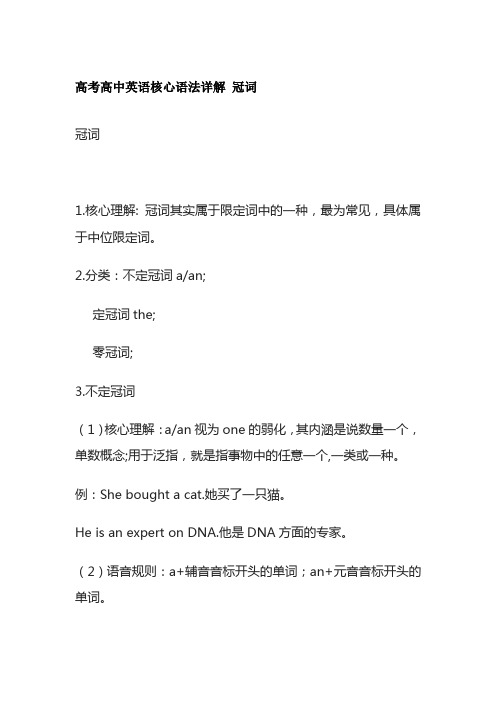
高考高中英语核心语法详解冠词冠词1.核心理解: 冠词其实属于限定词中的一种,最为常见,具体属于中位限定词。
2.分类:不定冠词a/an;定冠词the;零冠词;3.不定冠词(1)核心理解:a/an视为one的弱化,其内涵是说数量一个,单数概念;用于泛指,就是指事物中的任意一个,一类或一种。
例:She bought a cat.她买了一只猫。
He is an expert on DNA.他是DNA方面的专家。
(2)语音规则:a+辅音音标开头的单词;an+元音音标开头的单词。
例:a small island / an islanda European / an American4. 定冠词the (请参阅之前所发文章“词频01the”)5.零冠词:主要是名词本身,决定了不需要冠词,这种情况称之为零冠词。
(1)复数名词前用零冠词:Decisions in the EU are based on consensus.欧盟的决定是基于共识作出的。
(2)抽象名词前用零冠词:Wisdom is better than strength.智慧胜于力量。
抽象名词是概念化的东西,不是具体的事物,因此不需要特指或泛指,采用零冠词。
(3)专有名词前用零冠词:Beijing is a large city. 北京是个大城市。
专有名词的唯一性决定了要采用零冠词。
(前)中(后):(前修饰①限定词部分+前修饰②形容词部分)+ 中心词部分+ (后修饰部分)1. 核心理解:该位置的形容词在传统语法上称之为前置定语,主要用于描述名词,内涵是稳定不变,与名词本身所代表的常态不变类似。
2. 规则:该位置是形容词词性,只要放在该位置,一律视为形容词。
例:a diligent student 勤奋的学生a confusing plot 令人困惑的情节a broken heart 心碎3. 前②位置出现形容词词组前②位置是一个形容词词组,需要用一个连字符,构成复合形容词。
高考英语语法专项讲解---冠词(无答案)

高考英语语法专项讲解-冠词考点清单一不定冠词的用法一、不定冠词a,an的用法1.不定冠词a(n)表示“某一个”,相当于some,译为“一个”。
-Could you tell me the way to the Johnsons,please?-请告诉我去约翰逊家怎么走?-Sorry,we don’t have a Johnsons here in he village.对不起,我们这个村庄里没有一个叫约翰逊的人,2.不定冠词a(n)用于抽象名词前,意为“一种...的人或事”。
He suddenly appeared on a rainy night which was a great suprise to us.他在一个雨夜突然出现,使我们非常吃惊。
3.不定冠词a(n)用于有形容词修饰的不可数名词前。
a strong wind一场大风The walk is expected to last all day,so bring a packed lunch.这段路程预计要走一整天,所以带一份盒装午饭。
4.不定冠词a(n)用于有形容词修饰的季节、日期前。
We had a very cold winter last year. 去年我们度过了一个寒冷的冬天。
5."a/an+序数词“不表示排序,表示“又一、再”。
→"the+ 序数词”表示排序!In order to find a better job,he decided to study a second foreign language.为了找到一份更好的工,他决定再学习一门外语。
6.不定冠词a(n)用于形容词最高级前无比较含义,表示程度,意为“很,非常”。
He is a most wise man.他是一个非常英明的人。
7.用于固定搭配中,如:as a matter of fact,in a hurry,in a word, have a( n)... knowledgeof, have a/an. .. understanding of,a waste of,a variety of,quite a few,in a way,all of a sudden,live a(n) +adj. +life等。
冠词_高中英语语法
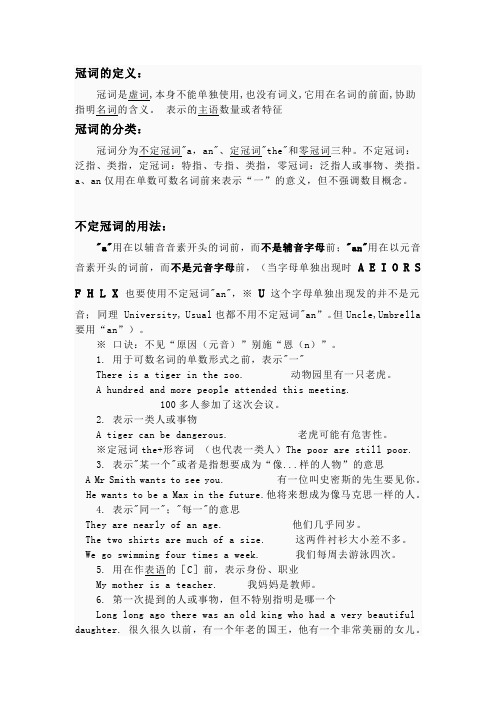
冠词的定义:冠词是虚词,本身不能单独使用,也没有词义,它用在名词的前面,协助指明名词的含义。
表示的主语数量或者特征冠词的分类:冠词分为不定冠词"a,an"、定冠词"the"和零冠词三种。
不定冠词:泛指、类指,定冠词:特指、专指、类指,零冠词:泛指人或事物、类指。
a、an仅用在单数可数名词前来表示“一”的意义,但不强调数目概念。
不定冠词的用法:"a"用在以辅音音素开头的词前,而不是辅音字母前;"an"用在以元音音素开头的词前,而不是元音字母前,(当字母单独出现时 A E I O R S F H L X 也要使用不定冠词"an",※U这个字母单独出现发的并不是元音;同理 University, Usual也都不用不定冠词"an”。
但Uncle,Umbrella 要用“an”)。
※口诀:不见“原因(元音)”别施“恩(n)”。
1. 用于可数名词的单数形式之前,表示"一"There is a tiger in the zoo. 动物园里有一只老虎。
A hundred and more people attended this meeting.100多人参加了这次会议。
2. 表示一类人或事物A tiger can be dangerous. 老虎可能有危害性。
※定冠词the+形容词(也代表一类人)The poor are still poor.3. 表示"某一个"或者是指想要成为“像...样的人物”的意思A Mr Smith wants to see you. 有一位叫史密斯的先生要见你。
He wants to be a Max in the future.他将来想成为像马克思一样的人。
4. 表示"同一";"每一"的意思They are nearly of an age. 他们几乎同岁。
英语语法复习 冠词

6.用于乐器名称前。
如:the piano,the violin the guitar
• eg: He plays the piano very well.
• 7.用于姓的复数前,表示一家人。
• 如:the Browns 布朗一家人 • eg: The Greens have no children. • The Smiths live next to us.
ቤተ መጻሕፍቲ ባይዱ
但需要注意的是:若不是指活动而是指具体的实物,则要加冠词: 试着比较下列句子: go to the bed (到床边去) (侧重床这个实物) go to bed (上床睡觉)(侧重于 与床有关的活动,即睡觉的意思)
• eg: • Her husband was put into ___ prison, and she had to go to ___ prison once a month to visit him. • A a the B the the C / / D / the
• go to school 上学 go to the school 到学校 • on horseback 骑着马 on the horseback 在马 背上 a teacher and writer 一位教师兼作家 • a teacher and a writer 一位教师和一位作家
一个词吓死人
• • • • • • • • • 最后我们再来看一看用与不用冠词的差异。 In hospital住院 in the hospital (在医院里) go to sea 出海 go to the sea 去海边 on earth 究竟 on the earth 在地球上 in front of 在...(外部)前面 in the front of 在...(内部)前面 take place 发生 take the place of 代替 at table 进餐 at the table 在桌子旁 by sea 乘船 by the sea 在海边 in future从今以后 将来 in the furure 未来
英语语法大攻克--名词代词冠词测试题
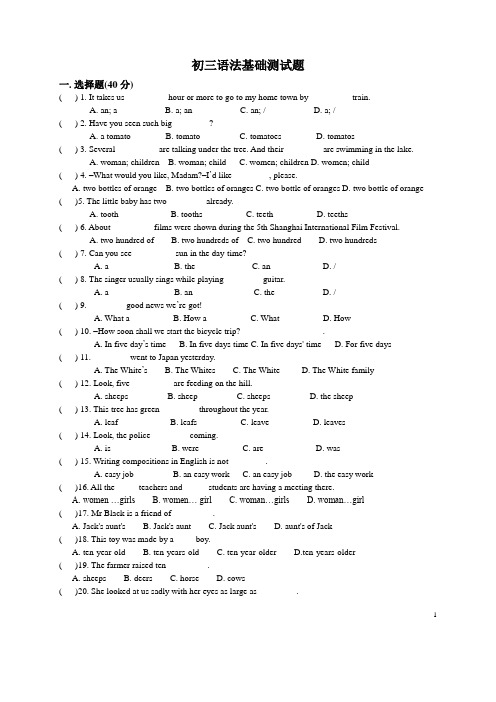
初三语法基础测试题一.选择题(40分)( ) 1. It takes us _________ hour or more to go to my home town by _________ train.A. an; aB. a; anC. an; /D. a; /( ) 2. Have you seen such big ________?A. a tomatoB. tomatoC. tomatoesD. tomatos( ) 3. Several _________ are talking under the tree. And their ________ are swimming in the lake.A. woman; childrenB. woman; childC. women; childrenD. women; child( ) 4. –What would you like, Madam?–I’d like ________, please.A. two bottles of orangeB. two bottles of orangesC. two bottle of orangesD. two bottle of orange ( )5. The little baby has two ________ already.A. toothB. toothsC. teethD. teeths( ) 6. About _________ films were shown during the 5th Shanghai International Film Festival.A. two hundred ofB. two hundreds ofC. two hundredD. two hundreds( ) 7. Can you see _________ sun in the day-time?A. aB. theC. anD. /( ) 8. The singer usually sings while playing ________ guitar.A. aB. anC. theD. /( ) 9. ________ good news we’re got!A. What aB. How aC. WhatD. How( ) 10. –How soon shall we start the bicycle trip? -- _________.A. In five day’s timeB. In five days timeC. In five days' timeD. For five days( ) 11. ________ went to Japan yesterday.A. The White’sB. The WhitesC. The WhiteD. The White family( ) 12. Look, five _________ are feeding on the hill.A. sheepsB. sheepC. sheepsD. the sheep( ) 13. This tree has green ________ throughout the year.A. leafB. leafsC. leaveD. leaves( ) 14. Look, the police ________ coming.A. isB. wereC. areD. was( ) 15. Writing compositions in English is not ________.A. easy jobB. an easy workC. an easy jobD. the easy work( )16. All the _____teachers and______students are having a meeting there.A. women …girlsB. women… girlC. woman…girlsD. woman…girl( )17. Mr Black is a friend of _________.A. Jack's aunt'sB. Jack's auntC. Jack aunt'sD. aunt's of Jack( )18. This toy was made by a ____ boy.A. ten-year-oldB. ten-years-oldC. ten-year-olderD.ten-years-older( )19. The farmer raised ten _________.A. sheepsB. deersC. horseD. cows( )20. She looked at us sadly with her eyes as large as_________.1A. her grandmotherB. her grandmother'sC. her grandmothers'D. that of her grandmother ( )21. We'll give our English teacher a card for _________.A. the Teacher's DayB. Teacher's DayC. a Teacher's DayD. Teachers' Day( )22. Li Ping met an old friend of _______on a train yesterday.A. heB. himC. hisD. her( )23. _________are big and bright.A. The classroom windowB. The window of the classroomC. The windows of the classroomD. The classroom's windows( ) 24. _______ of the two girls is from Beijing.A. AllB. BothC. NoneD. Neither( ) 25. I have __________________to tell you.A. something importantB. anything importantC. important somethingD. important anything ( ) 26. There are ________ people in the factory now.A. thousand ofB. two thousandsC. thousands ofD. thousand( ) 27. The man over there is my brother. _______ is a doctor.A. SheB. HeC. HersD. His( ) 28. I have two cats. One is black, and _______ is white.A. anotherB. someC. otherD. the other( ) 29. I’m looking for a babysister (保姆). She must be ________ too old ________ too young.A. neither; norB. both; andC. either; orD. not only; but also( ) 30. –What’s in your car? -- _______.A. No oneB. NothingC. NobodyD. None( ) 31. There are quite a few old books on the shelf, but _______ of them is useful to him.A. bothB. allC. neitherD. none( )32. –Is this short-wave radio _______? --No. it belongs to _______.A. yours; meB. yours; hisC. her; himD. yours; her( )33.We had plenty of paper but______ink.A. a fewB. fewC. not manyD. not much( )34. My car is not so expensive as ________.A. himB. he'sC. heD. his( )35. Lily and Lucy have arrived,but _______students aren't here yet.A. otherB. othersC. the otherD. the others( )36. There are high buildings on ______side of the street.A. bothB. everyC. anyD.either( )37. -What do you usually have for breakfast? -______eggs and ______milk.A Little ... a few B. A little ... a little C. A few ... a little D. A few ... a few( )38. ______ is difficult in the world if you put your heart into it.A. SomethingB. AnythingC. NothingD. Everything( )39.Help ____________to the fish, Jim and Simon.A. yourselfB. yourselvesC. himselfD. themselves( )40. Someone is knocking at the door._______must be Tom.A.ThatB. ltC. HeD. This2二.根据句意,用所给单词的正确形式填空.(15分)1.The teacher gave me some _____________(advice)on how to study English.2.How many ___________(mouse)are there in the old house ?3.All the _____________(roof) are covered with snow. Roofs4.There are ten _____________(woman) teachers to be the volunteers.5.I don’t like ________________(chicken),but I like my two____________(chicken).6.The _________(green) were watching TV.7.The visitors are___________(German),we are ____________(China)8.He is a friend of ________________(my sister)9.“I must go out now”, she said to ______________(she).10.Tomorrow is _____________(child) Day.11.He wants to take some ____________(photo)12.Could you show _______(we) a photo ?13.My family _____________(watch) TV now.三.用a/an, the 或/填空.(5分)1.There is ____________ “N” in the word “need”.2.She is ill ,and she is in _________hospital now .3._______ sun rises in the east.4.Sue could play ___________piano.5.He is ___________tallest boy in his class.四.同义句转换.(10分)1.There is nothing in her schoolbag.There ____________ ____________ in her schoolbag.2.Edison taught himself Science.Edison __________________Science ___________ __________.3.The Smiths had a good time last Sunday.The Smiths __________ _____________ last Sunday.4.Jim always gets to school on time.Jim is never ___________ ____________ school.5.What a beautiful girl she is !____________ ____________ ____________ ____________ is !五.完成句子.词数不限.(共10分)1.从我家到学校走路要用10分钟的时间.It ______________ten minutes _________ _______from my home to school.2.保持健康对我们来说是很重要的.It’s important ________ _________ _______ __________ ____________.3.虽然她数学成绩不好,但她仍然很努力地学习。
语法讲解:冠词2024-2025学年新人教版英语七年级上册
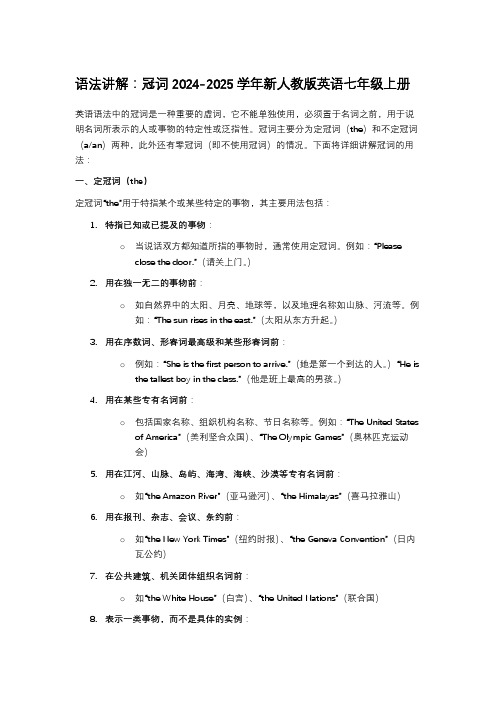
语法讲解:冠词2024-2025学年新人教版英语七年级上册英语语法中的冠词是一种重要的虚词,它不能单独使用,必须置于名词之前,用于说明名词所表示的人或事物的特定性或泛指性。
冠词主要分为定冠词(the)和不定冠词(a/an)两种,此外还有零冠词(即不使用冠词)的情况。
下面将详细讲解冠词的用法:一、定冠词(the)定冠词“the”用于特指某个或某些特定的事物,其主要用法包括:1.特指已知或已提及的事物:o当说话双方都知道所指的事物时,通常使用定冠词。
例如:“Please close the door.”(请关上门。
)2.用在独一无二的事物前:o如自然界中的太阳、月亮、地球等,以及地理名称如山脉、河流等。
例如:“The sun rises in the east.”(太阳从东方升起。
)3.用在序数词、形容词最高级和某些形容词前:o例如:“She is the first person to arrive.”(她是第一个到达的人。
)“He is the tallest boy in the class.”(他是班上最高的男孩。
)4.用在某些专有名词前:o包括国家名称、组织机构名称、节日名称等。
例如:“The United States of America”(美利坚合众国)、“The Olympic Games”(奥林匹克运动会)5.用在江河、山脉、岛屿、海湾、海峡、沙漠等专有名词前:o如“the Amazon River”(亚马逊河)、“the Himalayas”(喜马拉雅山)6.用在报刊、杂志、会议、条约前:o如“the New York Times”(纽约时报)、“the Geneva Convention”(日内瓦公约)7.在公共建筑、机关团体组织名词前:o如“the White House”(白宫)、“the United Nations”(联合国)8.表示一类事物,而不是具体的实例:o这通常出现在复数名词前,如“The elephants are intelligent animals.”(大象是聪明的动物。
高考英语复习语法知识专题讲解2---冠词(解析版)
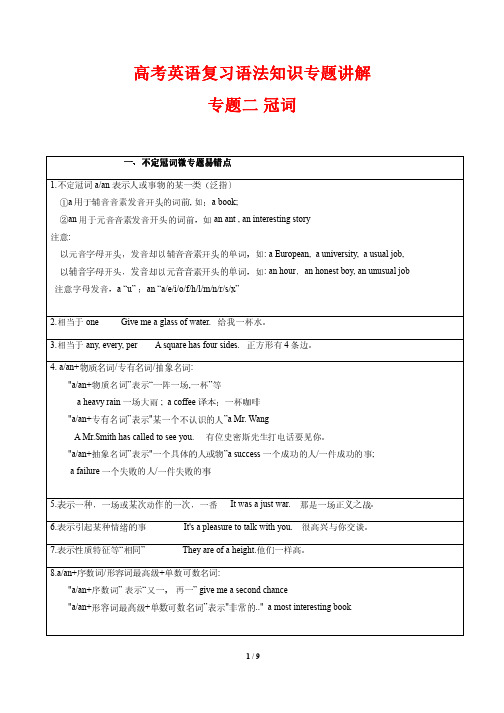
高考英语复习语法知识专题讲解专题二冠词一、不定冠词微专题易错点1.不定冠词 a/an 表示人或事物的某一类(泛指)①用于辅音音素发音开头的词前, 如:a book;a②用于元音音素发音开头的词前,如 an ant , an interesting storyan注意:以元音字母开头,发音却以辅音音素开头的单词,如: a European, a university, a usual job, 以辅音字母开头,发音却以元音音素开头的单词,如: an hour,an honest boy, an unusual job 注意字母发音,a “u” ;an “a/e/i/o/f/h/l/m/n/r/s/x”2.相当于one Give me a glass of water. 给我一杯水。
3.相当于 any, every, per A square has four sides. 正方形有4条边。
4. a/an+物质名词/专有名词/抽象名词:"a/an+物质名词”表示“一阵一场,一杯”等a heavy rain 一场大雨 ; a coffee 译本:一杯咖啡"a/an+专有名词”表示"某一个不认识的人”a Mr. WangA Mr.Smith has called to see you. 有位史密斯先生打电话要见你。
"a/an+抽象名词”表示"一个具体的人或物”a success 一个成功的人/一件成功的事;a failure一个失败的人/一件失败的事5.表示一种,一场或某次动作的一次,一番 It was a just war. 那是一场正义之战。
6.表示引起某种情绪的事 It's a pleasure to talk with you. 很高兴与你交谈。
7.表示性质特征等“相同” They are of a height.他们一样高。
8.a/an+序数词/形容词最高级+单数可数名词:"a/an+序数词” 表示“又一,再一” give me a second chance"a/an+形容词最高级+单数可数名词”表示"非常的.." a most interesting book9.含有不定冠词的固定搭配as a result/consequence结果 keep an eye on照看take a rest/break休息一下 in a word简言之in a hurry匆忙地 in a way/sense在某种意义上make a living谋生 as a matter of fact 事实上pay a visit to 参观;拜访 go on a diet节食at a loss不知所措 give sb. a hand / do sb. a favor 帮助某人have a cold感冒 all of a sudden 突然have a fever/temperature 发烧 give sb.a lift 让某人搭便车have a gift for... 在……方面有天赋 have a word with 与……谈话a waste of... 浪费…… once in a while 偶尔二、定冠词the微专题易错点1.特指某人某事①这些人或事往往是第二次提到的John bought a TV set and a radio, but he returned the radio the next day.约翰买了一台电视和一个收音机,但次日他就把收音机退了回去。
初三英语语法--冠词

3. Do you know _______girl on ________another side of ________ lake?
the,/, the ( 特指这个女孩用the;名词前已有定语another;)
4. There's ________ "u" and ________ "s" in ________work "use".
(9) 一些习惯用语中不用。 ⑴ at / to / from / out of
• • • • • • • • • • • •
night/noon/midnight; ⑼at night/noon/midnight; ⑽ on foot; foot; ⑾ go to school/bed; school/bed; ⑿ on top of; of; ⒀ in front of; of; ⒁on
• (10)用在姓氏之前表示一家人。 • 如:The Greens are going to Mount Emei next month.(下个月格林一家要去峨 眉山) • (11)same之前一般用the。 • 如:Lucy and Lily look the same.( .(露西 和莉莉看上去长得一样) • (12)几个用定冠词的习语:at the same time (与此同时),make the bed(铺床),in the end(最后),all the time(一直),by the way(顺便说一下),on the way(在路上)等等。
不定冠词a / an的用法
• 不定冠词a / an用在单数名词的前面,a 用在辅音开头的词前面; an用在元音开 头的词的前面。
英语语法总结-冠词

初中英语语法大全:冠词冠词是虚词,本身不能单独使用,也没有词义,它用在名词的前面帮助指明名词的含义。
冠词分为不定冠词a(an)和定冠词the两种。
不定冠词仅用在单数可数名词前面,表示“一”的意义,但不强调数目观念,只表示名词为不特定者。
定冠词则表示名词为特定者,表示“这”、“那”、“这些”、“那些”的意思,在可数的单复数名词或不可数名词前面都可以用。
I 不定冠词We need an apple and a knife.我们需要一个苹果和一把刀子。
1.a和an的区别不定冠词有a[+]和an[+Q]两种形式,a用于辅音(不是辅音字母)开头的词前。
an用于元音(不是元音字母)开头的词前。
a boy, a university, a European countryu是元音字母,但发音是[U(],是辅音。
an hour ,an honor ,an islandh是辅音字母,但它不发音,它的音标是是元音。
an elephant,an umbrella,an egg2(1)不定冠词的用法①泛指—类人或物。
eg. This is a pencil case.②指不具体的某个人或物。
eg. I met an old man On my way home.③用在序数词前,相当于another.eg. There’s a third boy near the shop.④表示“每—(个)”,相当于every.eg. They have music lessons twice a week.必背!give a lesson take a bath have a rest教(一堂)课洗(个)澡休息have a talk have a fever have a good time听报告发烧过得愉快have(take)a walk have a headache have a nice trip散步头疼旅途愉快a lot of, a lot, a little, a few, a glass of, such a/an, have a word with, have a look, have a try, have a swim, a quarter, half an hour, three times a day, have a talk, give a talk, ten Yuan a kilo(2)不定冠词的位置①不定冠词—般放在所修饰的单数可数名词前。
- 1、下载文档前请自行甄别文档内容的完整性,平台不提供额外的编辑、内容补充、找答案等附加服务。
- 2、"仅部分预览"的文档,不可在线预览部分如存在完整性等问题,可反馈申请退款(可完整预览的文档不适用该条件!)。
- 3、如文档侵犯您的权益,请联系客服反馈,我们会尽快为您处理(人工客服工作时间:9:00-18:30)。
冠词△基本型用适当的冠词填空,不需要冠词的空白处填“X”:1. The car is running about sixty miles ___ _ hour.2. My friend is interested in __________ science.3. Don’t worry, we still have ________ little time left.4. John is _________ cleverest boy in his class.5. March 8 is _________ Women’s Day.6. _________ Greens will come to see you tomorrow.7. Here is ________ black blouse, __________ blouse is hers.8. They always have ________ bread for __________ dinner.9. I prefer playing _______ piano to playing _________ basketball.10. ________ harder we study, _________ more we’ll learn.△提高型1.We can’t see ______ sun at ______ night.A. a; /B. a; theC. the; /D. the; the2. Students often play ___ volleyball in __ afternoon.A. /; anB. /; theC. the; anD. a; the2.Is Canada _______ English speaking countryA. /B. aC. anD. the4. This is _______ orange. It is _______ small orange.A. an; anB. an; aC. /; theD. the; a5. _____ UN report says that there will be standing room only on ____ earth then.A. A; theB. A; /C. An; /D. An; the6. We’ve never seen ________film before. It’s very interesting.A. so a goodB. a so goodC. a such goodD. such a good7. There is _______ ―x‖ in ______ word ―six‖.A. a; theB. a; anC. an; theD. a; a8. Look! _______ fine weather it is today!A. What aB. whatC. how aD. how9. _____ Yellow River is ____ second longest river in China.A. The; theB. /; aC. The; aD. The; /10. John Smith is __ of the two young men.A. strongB. a strongerC. the strongerD. the strongest△综合型1. –--What color is ______ orange? -----It’s _______ orange.A. an; anB. an; theC. an; /D. /; an2. Look! ______ good time the children are having!A. HowB. How aC. WhatD. What a13. London is _____ capital of _____ England.A. the; theB. a; aC. a; theD. the; /4. There’re ___ few mistakes in your homework. Don’t make __ same mistakes again.A. a; aB. a; theC. the; theD. /; the5. Most of the students in our class go to _____ school by bike every day.A. /; /B. the; aC. /; aD. the; the6. Don’t give up. You can try for _______ second time.A. theB. anC. aD. /7. She took me by ___ hand and led me into ____ room.A. my; aB. the; theC. a; theD. my; the8. What ____ interesting game it is! It must be ____ great fun.A. an; aB. a; theC. the; /D. an; /9. The house in ______ front of the river is on ______ fire.A. /; /B. the; theC. the; /D. /; a10. He often says ______ rich should help _______ poor.A. the; aB. a; theC. the; theD. /; /11. --–What can you see by the lake?---I can see ____ old man sitting on the chair.A. aB. anC. theD. /12. –-Have you had ______ lunch yet? ---No, not yet.A. /B. aC. theD. an13. One morning he found a bag. There was _ ―s‖ on the corner of _ bag.A. a; aB. a; theC. an; aD. an; the14. There’s ______ egg on the plate. _____ egg is for you.A. a; AB. an; AnC. an; TheD. the; An15. Did you enter for _____ high jump or _____ 400-metre race?A. a; aB. a; theC. the; aD. the; the16. ____ old man in black has waited for you for half ______ hour.A. The; anB. The; aC. An; aD. An; 不填17. ___ elephant is ___ useful animal.)A. An; an B. An; a C. The; an D. A; an18. –-I saw ___ story-book on the teacher’s desk?--___ book is Li Ming’s.A. a; AB. the; TheC. the; AD. a; The19.There is ______man over there, _____man is from Renhua, and he is studying in_______Beijing University.A. the, the ,theB. a, a, aC. a , the, theD. a, the, /\2中考实战题【2011•四川南充】17. My uncle is ________ engineer. He works very hard.A. theB. aC. an【2011•四川广元】18 Susan joined an art club at ___age of six and paints well.A. theB. anC. a【2011•四川凉山】19.John can play _____ guitar, but he can’t play ______ chess.A. the;/B. /;theC. the; the【2011•四川达州】20. —What useful book it is!—Yeah, it tells you how to playguitar.A. an;theB. a;aC. a;theD. an;a【2011•山东东营】21. Gelivable (给力) has become hot word this year.A. aB. anC. theD. /【2011•广西柳州】22. Mrs Smith has _____ son and a daughter.A. aB. anC. the【2011•湖南岳阳】23. Your sister has bad cold, and you must give her some medicine ___________ this afternoon.A. an;\B. a;\C.\;the【2011•江苏泰州】24. Li Na plays ______ tennis very well. She has become ______ first Asian woman to reach a Grand Slam(大满贯) final.A. a; theB. /; theC. the; aD./; a【2011•广东梅州】25. Miss Lin wants to lose weight. She just has _____ cup of milk for _____ breakfast every day.A. a; theB. a; (不填)C. the; aD. the; (不填) 【2011•重庆江津】26. Meimei’s father is teacher in a school.A. /B. anC. aD. the【2011•广西玉林】27.Yesterday we went to____ amusement park .____ park was very crowded.A. a; TheB. an; TheC. an; /D. the; The【2011广西贺州】28. —lily is coming by_____ plane tomorrow.—Let s go to _ airport to meet her.A. a; aB. /; aC. the; theD. /; the【2011•广西梧州】29. There is _____ pencil on the desk.A.anB. aC. theD. /【2011•齐齐哈尔】30.There is big supermarket in center of our city.A. a; theB. the; aC. the; the【2011•福建福州】31.----What does Michael look like ?-----He has black eyes and _____ wide mouth.A. aB. anC. the【2011•山东滨州】32. ---How was _____ dinner at Mike’s house ?----It was great. Mike’s mum is ______ wonderful cook.A. a theB. the ; aC. the; theD. a; an【2011•湖北随州】79. As we know, England is _______ European country and Singapore is ______Asiancountry.A. an; anB. an; aC. a; aD. a; an3。
